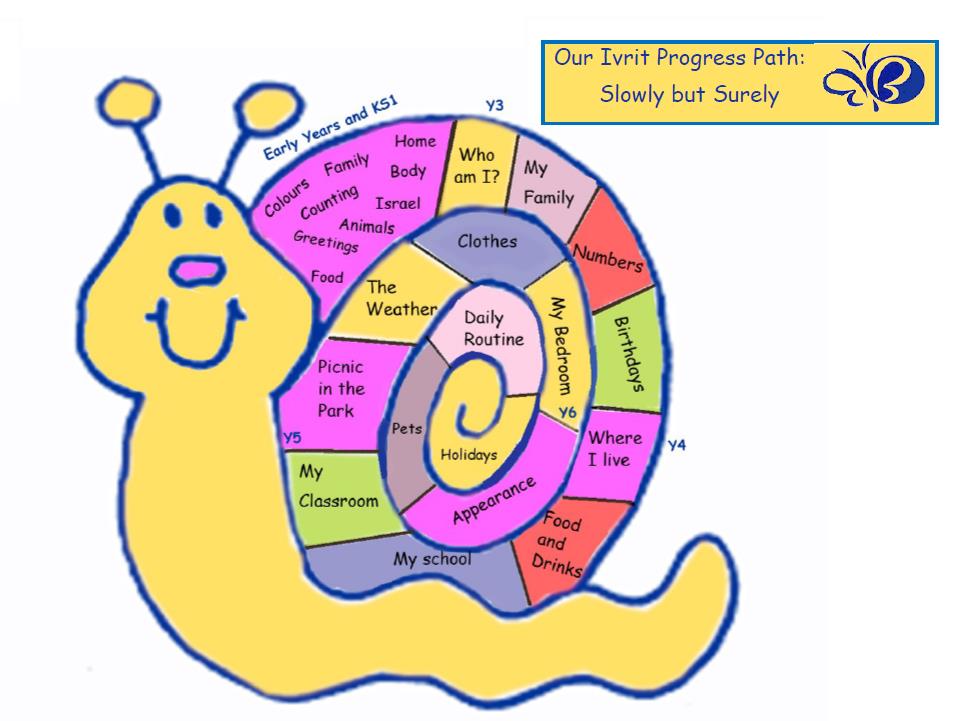Ivrit (Modern Hebrew)
Intent
“Learning a foreign language is a liberation from insularity and provides an opening to other cultures. A high-quality languages education should foster pupils’ curiosity and deepen their understanding of the world. The teaching should enable pupils to express their ideas and thoughts in another language and to understand and respond to its speakers, both in speech and in writing. It should also provide opportunities for them to communicate for practical purposes, learn new ways of thinking and read great literature in the original language. Language teaching should provide the foundation for learning further languages, equipping pupils to study and work in other countries.” National curriculum in England: languages programmes of study (2013), Purpose of study
This inspiring purpose of study from the National Curriculum has been at the basis of the development of our Modern Foreign Language (MFL) provision intent at Brodetsky Primary School. In line with the new government KS2 approach for MFL, our teaching emphasise the three pillars of Vocabulary, Grammar, and Pronunciation.
It has only been natural for our school to choose Modern Hebrew as our MFL for this purpose. The main reason for this is that, as children are anyway exposed to Classical Hebrew (also called Biblical Hebrew, Classical or Ancient Hebrew or just ‘Hebrew’) through their Jewish Studies (LK), and both languages are very similar to each other, learning Modern Hebrew would allow them to capitalize on this instruction and strengthen both the Biblical Hebrew and the Modern Hebrew (nicknamed ‘Ivrit’, which means ‘Hebrew’ in Modern Hebrew).
The LK (Jewish Studies) and Ivrit teachers work hand in hand, in the Department of ‘LK and Ivrit’, to support and enhance the teaching of each other’s subjects. However, we believe it is important to remember that Ivrit is the children’s foreign language provision, and as such teaches the same topics as any other Modern Foreign Language (i.e., colours, animals, food, talking about school, family and friends, etc.).
Our intention is to open a window to the world of Ivrit, awaken the children’s curiosity for it and give them a sense of satisfaction for being able to communicate or understand communication in the foreign language.
It is our mission that, when our pupils leave Brodetsky at the end of their Primary years, they will have developed a genuine enthusiasm for learning languages, a natural understanding that different languages follow different patterns and rules, and the belief that learning a language can be fun and rewarding. Our aim is that, having learned one language to some depth, they will be ready to approach any other Modern Foreign Language in high school with excitement and confidence.
Implementation
To achieve the ambitious goals that we set up in our Curriculum Intent, we follow a spiraling methodology, which implies progressing whilst repeating, constantly revisiting learned material whilst adding new vocabulary and grammar rules, at the same time as strengthening words and expressions that can be used in any topic. We use many games and game-like activities, some competitive, to raise the students’ motivation and ensure repetition is fun rather than tedious.
All along their learning path, the children are practising asking and answering key conversational questions, which repeat and expand from Early Years to Y6. From presenting themselves to telling what their favourite colour is, or what they have eaten in the morning, they are receiving the tools to hold a basic conversation in Hebrew, which should give them confidence in expressing themselves in another language. Click here to see the list of the questions per year.
The children also experience listening to Hebrew through the insertion of as much Hebrew language as possible during the lessons, where class material and instructions are often given in Hebrew. This explains why some questions at Reception level seem relatively advanced, as the question might be asked and answered partly in English.
At Key Stage 1, the children start their reading learning path with the Aleph Champ programme, which breaks down Hebrew reading into manageable goals and levels, with a very motivational levels system that children are proud to progress through. The programme thrives on self-motivation, and has the advantage of enabling families to practise with their children, which the school encourages. If you would like to support your children, but are unsure yourself as to how to read Hebrew, please see our handy guide by clicking here or by contacting mfromm@brodetsky.org who can direct you to adult lessons happening locally.
Our children are encouraged to write in script (as opposed to writing in ‘Block’ or ‘Print’) as soon as possible, so that they develop their writing skills in the correct way right from the start of their journey.
At Key Stage 2, we use the Ivrit be’Click program which has been created by the Israeli Centre for Educational Technology attached to the University of Tel Aviv, for Y3-Y6 children learning Hebrew as a second language. One of the innovations of this programme is that it features clips of Israeli children, native Hebrew speakers, talking about the topics we learn, as described in our ‘Snail progress path’ below. The children are now used to follow the path of our snail, and are aware that it has been chosen for two main characteristics: on one hand, it shows our spiraling approach, and on the other hand, that we are progressing ‘Slowly and steadily, but surely’.
Our Ivrit curriculum enables us to progress with many cross-curricular activities, whether by linking Modern Hebrew words to their biblical counterpart met in LK, by using strategies taught in secular lessons for reading and understanding texts, by attempting creative writing, or by using role plays, to cite only a few.
In parallel with these plans, we operate a system by which the pupils are regularly taken out of LK/Ivrit lessons to practise in small groups, whether it is their reading or conversations skills. The small groups enable every child to shine and allow a more targeted teaching than in the larger class setting.

N.B. Some of the path above had to be amended during the Covid years, but we are progressively returning to following this path as planned.
Impact
We assess the progress of our students in various ways, throughout the teaching, in both formative and summative ways. At the end of each unit, the children are assessed with differentiated tests that allow them to achieve, each at their own level.
In Aleph Champ there are very clear mini tests that allow children to graduate from book to book, and they are rewarded with motivating colourful bracelets when they pass to the next level.
The Ivrit be’Click programme provides their own assessment tools at the end of each unit, but teachers in school also develop their own assessments according to the classes and the levels present in various groups of children.
Our children are assessed against clear criteria of what they can do. We have a series of ‘I can’ statements expected at each age, so that we can easily assess if a child performs below, at or above their expected age level.

